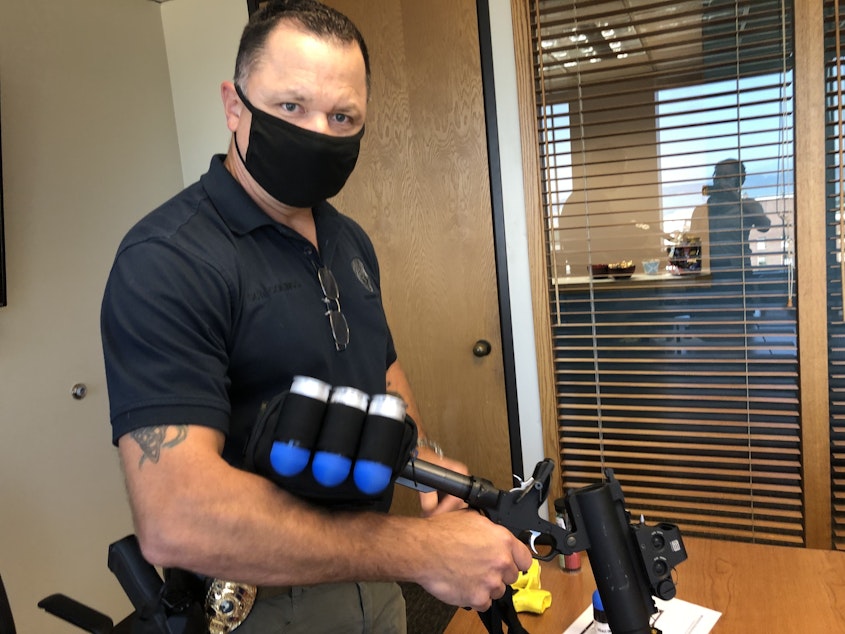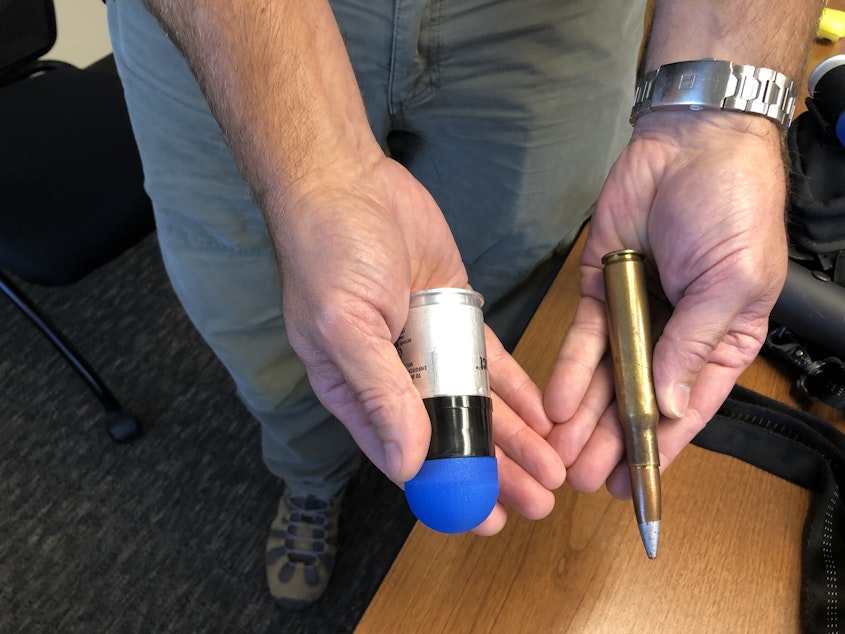Washington police divided on banning less-lethal ammunition under new law

Law enforcement agencies in Washington are facing a decision about whether to continue using less-lethal ammunition to detain people. This includes beanbag or sponge-tipped rounds. Police say those projectiles are good alternatives to lethal force, but they are technically banned under one of the state’s new police reform laws.
One of Washington’s new laws that took effect July 25, HB 1310, requires officers to act with reasonable care, including using “alternatives to deadly force.” But another new law, HB 1054, bans the use of firearms that shoot large-caliber ammunition, and makes no exception for non-lethal versions.
“When the legislation took effect, we literally went down to our different precincts and removed all the firearms or all the weapon platforms that we took as being part of the House bill and removed them from the street, from access to the officers, and locked them up in our armory," said Sergeant Tim Collings, training supervisor with the Everett Police Department.
Collings said he removed all the launchers that fire the bright-blue 40mm sponge-tipped projectiles from patrol and SWAT teams.
“The only platform they have right now, they can actually utilize for standoff, is pepper ball, which is a glorified paintball gun that shoots out small OC rounds,” he said. “Because it uses compressed air instead of gunpowder, it doesn’t qualify as a firearm under the RCW.”
He described one recent encounter where police would have used the 40mm launcher to detain a domestic violence suspect if they’d had access to it.
Sponsored
Collings said the man “was barricaded inside an apartment, and was yelling outside the window that he was armed with knives, and if officers were to force entry into the apartment, that he would either stab them or kill himself."
Collings says if officers had had the launcher, they would have broken down the man’s door and then waited outside. Without the launcher, they left the scene.
Collings said the delay may have posed some risks for the man’s mother, but they were able to arrest him two days later. He said his agency only fires the launchers a handful of times each year, but the launchers work well from up to 120 feet away, and taking them away creates more uncertainty for officers. Everett’s less-lethal options are now confined to Tasers, OC (pepper spray), and batons, he said.
Lacey Offutt is an attorney for the city of Everett and legal advisor to the police department. She recommended suspending use of the less-lethal firearms because their size makes them banned military equipment under House Bill 1054.
“Taking a very conservative approach, we felt that we were constrained by the language in 1054 as being the true guide for how this would be interpreted in the event of any sort of legal action,” she said.
Sponsored
Offutt said the ban on firearms and ammunition of .50 caliber or greater is straightforward and specific. But another new law, HB 1310, requires police to attempt de-escalation and states: “It is the fundamental duty of law enforcement to preserve and protect all human life.”
Less-lethal alternatives
DeVitta Briscoe advocated for the laws as the director of the group Not This Time. Her brother Che Taylor was killed by Seattle police officers in 2016. She said the laws clearly call for less-lethal alternatives.
“The goal of the bills is to reduce violence and it’s that simple. HB 1310 addresses use of force and emphasizes de-escalation over confrontation," she said.
Kent Police Chief Rafael Padilla said that argument — about the overarching intent of this year’s new laws — was persuasive to him and his colleagues in South King County. In a recent panel discussion for the League of Women Voters of Seattle-King County, Padilla said those agencies have decided to keep using less-lethal projectiles, despite the ban.
Sponsored
“What you had was a group of chiefs in South King who got together and made a leadership decision in the best interests of the community, and also in the best interests of the officers,” he said. “Because one of the things that’s not discussed very often is that it is extremely traumatic, regardless of the circumstances, to take someone’s life.”
Padilla said affirming law enforcement access to these less-lethal alternatives should be an easy point of consensus in the next legislative session.
“I want to note we’re working to get that fixed and we’ll be at the table and that’s probably not going to be an issue too much longer here.”

Representative Roger Goodman is the Democrat who chairs the House Public Safety Committee and worked to pass many of the new laws. He said the failure to exempt less-lethal firearms from the ban on military equipment was inadvertent.
Sponsored
“Nobody caught it, nobody pointed it out,” he said, noting legislators worked to pass more than a dozen bills related to law enforcement in the wake of the police killings of George Floyd in Minneapolis and Manuel Ellis in Tacoma and last summer’s Black Lives Matter protests.
Goodman said nobody wants to see police officers disciplined or penalized for using less-lethal alternatives.
“If they use the .50 caliber launcher to launch non-lethal, it’s not an excessive use of force, it’s not wrongdoing, nobody’s going to get in trouble, there’s not going to be an investigation, there are not going to be any sanctions," he said. "And I understand that line officers are worried about that. But we’re trying to provide them some peace of mind.”
New laws at odds
The state’s Criminal Justice Training Commission has also gained new powers to decertify police officers for wrongdoing in the last legislative session. The commission’s executive director Monica Alexander said she knows that penalty is one reason departments are afraid to continue using the less-lethal projectiles.
Sponsored
But she said she will not seek to penalize any officers who use them, especially considering that the new laws are at odds.
“Because of that conflict, I would not move that case forward for excessive use of force, especially if a situation is ended peacefully because of the use of less-lethal, opposed to using a firearm that would perhaps take someone’s life,” she said.
However, Everett attorney Lacey Offutt said if the city keeps using the large-caliber projectiles and gets sued, courts will look first to what the new law says, not to what lawmakers are now saying about it.
“Courts have regularly said that they don’t consider individual legislators’ statements of intent that occur after the bill has gone into effect when they make that determination,” Offutt said.
So Offutt is advising Everett police to hold off on using the less-lethal rounds until the Attorney General or legislators clarify the issue.
To fill the gap, Sgt. Collings said he’s ordered some new less-lethal alternatives that appear to comply with the new laws. One is “a pneumatic launcher akin to hopped-up paintball gun” that operates using compressed air to fire a bismuth projectile. They’re also looking into the bola-wrap, a cord with hooks that can be thrown to tie up a person’s legs, but is recommended for use at just 15 feet or closer.
He said the new equipment is on backorder, and none seems as versatile as the existing launchers. Collings said Everett has been an early adopter of de-escalation and crisis intervention training, so other elements of the new bills shouldn't cause big changes for the agency.
He said he’s hoping the Legislature restores the use of the less-lethal equipment as soon as possible. Otherwise, he says under the law, agencies are instructed to destroy all banned military equipment by the end of 2022.
If you have any feedback on this story, you can email me at aradil@kuow.org or find me on Twitter @AmyRadil. Or you can just click the feedback button on the right hand side of this page.




